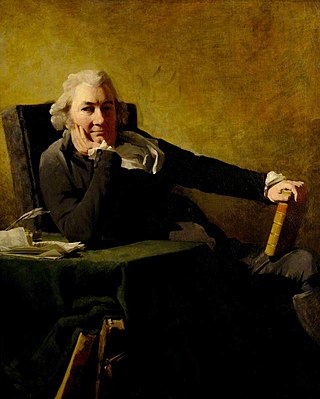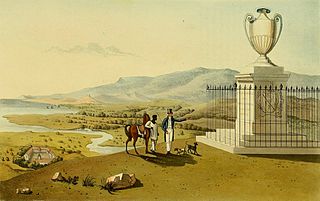Related Research Articles

Robert Graham, who took the name Bontine in 1770 and Cunninghame Graham in 1796, was a Scottish politician and poet. He is now remembered for a poem If doughty deeds my lady please, which was later set to music by his great-great-grandson, Rev. Malise Cunninghame Graham and also by Sir Arthur Sullivan.

Hanover is a parish located on the northwestern tip of the island of Jamaica. It is a part of the county of Cornwall, bordered by St. James in the east and Westmoreland in the south. With the exception of Kingston, it is the smallest parish on the island. Hanover is the birth parish of Alexander Bustamante, labour leader, first head of government of Jamaica under universal suffrage, and one of seven Jamaican National Heroes. Its capital is Lucea.
The Province of Georgia was a significant battleground in the American Revolution. Its population was at first divided about exactly how to respond to revolutionary activities and heightened tensions in other provinces. Georgia was the only colony not present in the First Continental Congress in 1774. When violence broke out in 1775, radical Patriots took control of the provincial government, and drove many Loyalists out of the province. Georgia subsequently took part to the Second Continental Congress with the other colonies. In 1776 and 1778, Georgia served as the staging ground for several important raids into British-controlled Florida. The British army captured Savannah in 1778, and the American and French forces failed to recapture the city during the Siege of Savannah in 1779. Georgia remained under British control until their evacuation from Savannah in 1782.

Thomas Hibbert (1710–1780) was an English merchant and plantation owner who became a prominent figure in colonial Jamaica.

The 8th New York State Legislature, consisting of the New York State Senate and the New York State Assembly, met from October 12, 1784, to April 27, 1785, during the eighth year of George Clinton's governorship, at New York City.

The House of Assembly was the legislature of the British colony of Jamaica. It held its first meeting on 20 January 1664 at Spanish Town. As a result of the Morant Bay Rebellion, the Assembly voted to abolish self-governance in 1865. Jamaica then became a direct-ruled crown colony.

Henry Dawkins II was a Jamaican plantation and slave owner and Member of the Parliament of Great Britain (MP).

Philip Dehany was a West Indies plantation owner and cricket pioneer. He sat in the House of Commons from 1778 to 1780.
Robert Osborn (1800–1878) was a Jamaican newspaper editor and campaigner for equal rights for free people of color.
Thomas Sutton was the speaker of the House of Assembly of Jamaica in 1691-92 and 1698.
Francis Rose was a plantation owner in Jamaica. He was active in the politics of the island and was elected to serve in the House of Assembly of Jamaica multiple times, becoming speaker in 1702, and later president of the Council of Jamaica.
Samuel Williams Haughton (1738–1793) was the speaker of the House of Assembly of Jamaica from 1778 to 1793.
The Receiver General of Jamaica was the public official in Jamaica responsible for receiving and disbursing money of the Government of Jamaica.
Hinton East was a Jamaican creole of English parents who was a member of House of Assembly of Jamaica for Kingston. He was also Judge Advocate General and Receiver General of Jamaica.
Florentius Vassall (1689–1778) was a wealthy planter and slave-owner in Jamaica. The Jamaican quit rent books for 1754 show that he owned 2,700 acres of land in Saint James Parish, 3,714 acres in Westmoreland Parish, and 1,943 acres in Saint Elizabeth Parish, a total 8,357 acres.
William McQuhae or M'Quhae (1737–1823) was a senior Scottish clergyman in the Church of Scotland who by the time of his death was Father of the Church. He is one of the few persons to have declined the offer to be Moderator of the General Assembly. He was a member of the New Light Movement. He is mentioned within the poems of Robert Burns.
References
- ↑ Cundall, Frank. (1915) Historic Jamaica. London: Institute of Jamaica. pp. xvi-xviii.
- ↑ Jasper Hall I. Legacies of British Slave-ownership, UCL. Retrieved 13 May 2019.